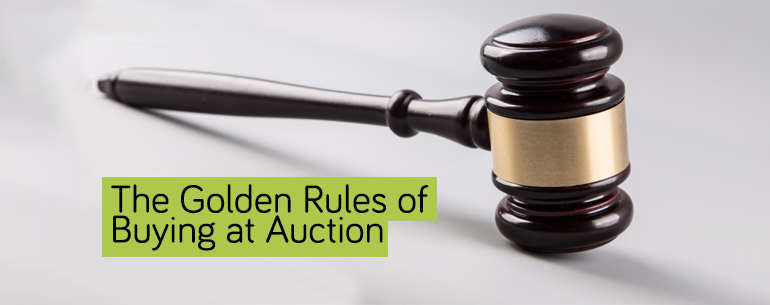
Auctions are one of the most varied, interesting and yet risky methods of buying property. They are a great way to avoid the lengthy and uncertain buying process, and there is always the potential to walk away with a great bargain deal. Flip the coin however and there is the face for landing in a world of property-related woe. So what are the keys to success of buying property at an auction?
The auction market for property is booming. In a report by EIG, 32,915 auction lots were offered for sale between December 2016 and November 2017. 76.5% of these lots sold, raising £4,542,000,000. Excluding owner-occupiers, auctions represent a modest proportion of the investor market and are in some stances, where investors will go to find value.
Now it’s fair to say that those who sell property via auctions are prepared to take the hit on the sale price. This however is almost a guarantee trade for the certainty of a sale (courtesy of the immediate exchange) and the speed of completion. The moment the hammer falls, the deal is agreed upon with no risk of fall-throughs further down the line.
Finding an auction
First and foremost is finding a property auction to buy property. The best place to start is with local auctions, registering for catalogues to see what lots are available and if any pique you interest.
Research prior to the auction
It’s important to study each catalogue and make a shortlist of any properties that strike your interest. One you’ve compiled a list, get in touch with the auctioneers and arrange appointments to view the properties, giving you as much insight as possible prior to the bidding.
It’s key to keep an open mind when visiting auction properties – they are often in a poor state and will require some work, but this is also the driving reason as to why some properties on auction can be absolute bargains.
Keep in mind to be setting a limit for your bids on prospective properties. Set appropriate amounts and certainly avoid paying over the odds. If you know a builder or architect then bring them along on viewings; you’ll gain a much better idea of what you’re letting yourself in for and any additional costs you may have to look at spending if you end up owning the property.
Auctioneers will often give you a legal pack for properties you’re interested in; this includes the title deeds, local authority and environmental searches, fixtures-and-fittings list and a seller’s information form, plus any relevant leasehold information. It may be worth asking a solicitor to look over this for any hidden covenants or loopholes that could end up costing you more than you bargained for.
To entice buyers the guide price is usually set a lot lower than what the property is likely to go for. It’s worth monitoring the guide price because if it goes up before the auction this might mean there is a lot of interest in the property.
Get your finances in order
If you need a mortgage, get a ‘mortgage in principle‘ sorted before the auction so it’s ready as soon as you own the property. As the hammer falls, you’ll have to pay 10%. Then you’ll only have a month to pay the remaining 90% – if you can’t you will lose the 10% as well as the chance of buying the property.
But that’s not all you’ll lose – you may have to cover the costs of re-selling the property, as well as any shortfall between the price you agreed and the final selling price. You may even be charged interest for every day until the property is sold, so it’s crucial to ensure there are supportive finances in the background.
On the day of the auction
Arrive early and find a spot that is not only comfortable for yourself, but also makes you easily visible to the auctioneer. Don’t however gun straight for the front, as this will make it difficult to keep an eye on any rival bidders. Make sure you take along two forms of identification, such as a passport, driving license or utility bill, as well as proof that you can afford to put down the 10% deposit.
Play it cool, don’t get caught in the moment and end up bidding more than you bargained for; there are always more properties if you struggle to get one. If you do miss out on one of your desired properties, don’t lose heart. There’s the possibility the property doesn’t sell for the reserve price and the seller is happy to consider the highest bidder, so consider approaching the seller after the auction has ended to make another offer.
It’s crucial to set a spending limit and sticking to it throughout the course of an auction. The most important rule to remember at an auction is that if you’re not happy and confident by auction day or with a property – then don’t bid!







